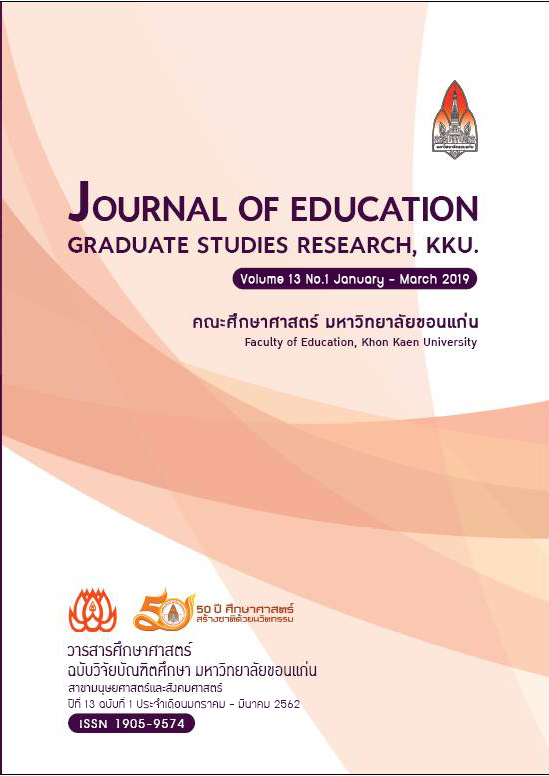Analysis of Mathematical Task Design in Lesson Study and Open Approach Classroom
Main Article Content
Abstract
The result found that, Lesson Study and Open Approach Classroom mathematical task design included with these follows elements:
1) Specific Domain: the target group specified mathematics content in content domains in every lesson plans through learning contents analysis.
2) Students’ Ideas: the target group considered students’ ideas in every lesson plans. They expected and sequenced the students’ ideas to discuss and compare these ideas.
3) Cognitive Development: the target group considered students’ cognitive development for some lesson plans and focused on their thinking efficiency during mathematical problem solving.
4) Pedagogical Content Knowledge: the target group appropriately considered the pedagogical content knowledge for some lesson plans. They considered the mathematics content, teaching approach for specific content and flow of lesson in teaching activities.
5) Mathematical Knowledge for Teaching: the target group considered the mathematical knowledge according to teaching during mathematical task design processes for some lesson plans. They set the learning objective according to mathematical contents, and considered the level of students’ difficulty.
Article Details
References
โกวิท ประวาลพฤกษ์. (2551). เพิ่มคุณภาพการเรียนรู้ด้วย backward design. กรุงเทพฯ: สถาบันพัฒนาวิชาการ (พว.).
ไมตรี อินทร์ประสิทธิ์. (2557). กระบวนการแก้ปัญหาในคณิตศาสตร์ระดับโรงเรียน. ขอนแก่น: เพ็ญ พริ้นติ้ง.
ไมตรี อินทร์ประสิทธิ์. (2559). คณิตศาสตรศึกษาเพื่อการเปลี่ยนแปลงของไทยในศตวรรษที่ 21: สถานการณ์ปัจจุบัน. เอกสารหลังการประชุมวิชาการด้านคณิตศาสตรศึกษา ครั้งที่ 2. หน้า 1-5.
ไมตรี อินทร์ประสิทธิ์ และคณะ. (2546). การปฏิรูปกระบวนการเรียนรู้คณิตศาสตร์ในโรงเรียนโดยเน้นกระบวนการคณิตศาสตร์. ขอนแก่น: ขอนแก่นการพิมพ์.
สุลัดดา ลอยฟ้า และ ไมตรี อินทร์ประสิทธิ์. (2547).การพัฒนาวิชาชีพครูแนวใหม่เพื่อส่งเสริมการเรียนรู้คณิตศาสตร์. KKU Journal of Mathematics Education 1, 18 – 28.
ประเวศ วะสี. (2543). สุขภาพในฐานะอุดมการณ์ของมนุษย์. พิมพ์ครั้งที่ 3. นนทบุรี: [ม.ป.พ.].
วิทยากร เชียงกูล. (2549). รายงานภาวะการศึกษาไทย ปี 2547/2548. กรุงเทพฯ: วี.ที.ซี. คอมมิวชั่น.
สำนักงานคณะกรรมการการศึกษาแห่งชาติ. (2542). พระราชบัญญัติการศึกษาแห่งชาติ พ.ศ. 2542. กรุงเทพฯ: พริกหวานกราฟฟิค.
สถาบันส่งเสริมการสอนวิทยาศาสตร์และเทคโนโลยี. (2556). รายงานผลการวิเคราะห์ข้อมูลเบื้องต้น: โครงการ PISA 2012 สถาบันส่งเสริมการสอนวิทยาศาสตร์และเทคโนโลยี (สสวท.). กรุงเทพฯ: สสวท.
Becker, J. P. & Selter, C. (1996). Chapter 14: Elementary School Practices. In Bishop, A. J., Clements, K., Keitel, C. & Kilpatrick, J. (Eds.). International Handbook of Mathematics Education Part 1. (pp. 511-564). Dordrecht, the Netherlands: Kluwer Academic.
Ball, D. L., Thames, M. H. & Phelps, G. (2008). Content Knowledge for Teaching: What Makes It Special?. Journal of Teacher Education, 59(5), 389-407.
Doyle, L. & Herrington, N. (1998). Learning Progression Across the Primary/Secondary Divide, All in Success, 9(2), 10-12.
Fujii, T. (2013). 6th East Asia Regional Conference on Mathematics Education (EARCOME 6). In Inprasitha, M. (ed.). Adapting and Implementing Lesson Study: Focusing on Designing Task in Lesson Study. (pp.163-172). Phuket, Thailand: [n.p.].
Inprasitha, M. (2011). One Feature of Adaptive Lesson Study in Thailand: Designing a Learning Unit. Journal of Science and Mathematics Education in Southeast Asia. 34(1), 47-66.
Polya, G. (1973). How to solve it. a New aspect of Mathematical Method Princeton. New Jersey: Princeton University.
Shimizu, Y., Kaur, H. B., & Clake, D. (2010). Mathematical tasks in classrooms Around the World. In Y. Shimizu, H. B. Kaur & D. Clake (Eds.). The Role of Mathematical Tasks in Different Cultures. (pp.9). Rotterdam, Taipei: Sense Publishers.
Smith, M. S., Bill, V., & Hughes, E. K. (2008). Thinking through a lesson: Successfully implementing high-level tasks. Mathematics Teaching in the Middle School, 14, 132-138.

